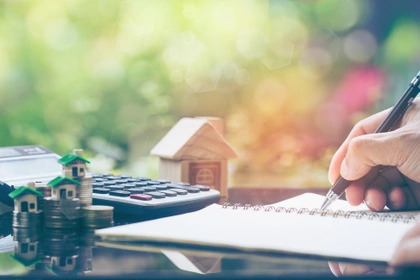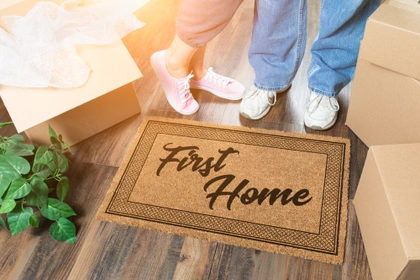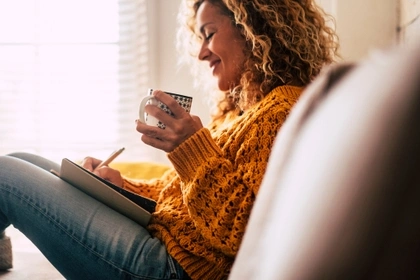What is a mortgage deposit?
A mortgage deposit (or house deposit) is essentially a lump sum that you put down on the property you want to buy. You then take out a mortgage to pay for the remainder of the house.
This works a bit like taking out a loan, as you have to pay back the balance with interest over an agreed timeframe. However, the mortgage is secured against your property, which means if you fall behind on your repayments, the lender could repossess your home (in the worst-case scenario).
When do I pay the deposit for my mortgage?
You transfer your deposit to your solicitor when you exchange contracts. This occurs after all the legal paperwork has been done - just before you complete the sale and pick up the keys.
Exchanging contracts is legally-binding, so if you pull out of the sale after this point, it’s unlikely you’d get your deposit back.
Is there a minimum deposit for a mortgage?
The minimum deposit required will vary depending on the lender and the mortgage product. For example, if you were to get a 85% mortgage, you would need to put down at least a 15% deposit, to cover 100% of the property’s value.
Bear in mind the more money you put down, the:
- more likely it is your offer will get accepted
- lower your monthly payments will be
- less you’ll pay in interest
- more chance you have of being offered a better mortgage deal
- bigger your buying budget will be
Can I get a mortgage with a 5% deposit?
When it comes to getting a mortgage with a 5% deposit, your options may be very limited as not many lenders offer 95% mortgages, due to the risk involved. For instance, if the value of your house drops in the future, there’s a chance you could go into negative equity (where you owe more than the house is worth) with a low deposit.
However, a new mortgage guarantee scheme is available from April 2021, where the government will ‘guarantee’ 95% mortgages for those with 5% house deposits.
To be eligible for this scheme you must be:
- purchasing a residential property that you’re going to live in
- taking the mortgage out in the name of an individual – not in the name of a business
- buying a property in the UK with a purchase value of £600,000 or less
- putting down a deposit of between 5% and 9%
- buying a property within the dates set out by the scheme
- taking out a repayment mortgage (not an interest-only mortgage)
- meet the eligibility criteria and requirements of the lender
How much deposit do you need for a buy-to-let mortgage?
You’ll normally need a higher deposit for a buy-to-let mortgage compared to a residential mortgage. This is typically upwards of 25%, but can vary between 20% - 40% depending on the lender’s criteria.
Like buying a house for yourself, the bigger your mortgage deposit on a buy-to-let, the more likely it is that your offer will be accepted – and with more competitive interest rates.
You need a larger mortgage deposit because it’s riskier to lend to you when you’re acting as a landlord. For instance, you’ll need to find tenants to occupy the property and if you can’t find anyone you might struggle to meet the repayments.
How much do I need for a mortgage deposit if I have bad credit?
There isn’t an exact amount of money you need to save for a house deposit when you have bad credit. However, having a large deposit could make it easier for you to get accepted if your credit score isn’t great – as it may offset some of the risks to the lender.
If you have bad credit, lenders are more likely to see you as risky to lend to because they may be concerned that you:
- can’t afford the repayments if you have other debts to repay
- may miss or make late payments if you have done so in the past
Getting help with your mortgage deposit
We know it can be difficult to save up for a house deposit. If you’re struggling, there are various options available that may help:
1. Mortgage deposit from parents
Many first-time buyers are relying on a gifted deposit from their parents to get a mortgage. This is when part (or all) of the deposit is gifted to the property buyer – and they aren’t expected to pay it back.
Some parents may prefer to give money towards their child’s deposit as a loan instead of a gift. In which case the loan repayments will be factored into the mortgage provider’s affordability calculations.
You are likely to be asked to provide evidence of where the gift or loan came from. This could be a signed letter from your parents stating the deposit is a gift or loan, along with a copy of their signed ID and a bank statement, for example. This forms part of the lender’s money-laundering checks, to make sure everything is above board.
2. Joint mortgage
You could consider getting a joint mortgage with someone you trust, like a partner, family member or friend. Then you can pool your savings together and boost your deposit. By clubbing together, you should also be able to afford somewhere that you wouldn’t be able to buy on your income alone.
Bear in mind that both parties will be fully responsible for paying the mortgage. So, if one person falls behind, the other person will need to pay the full amount each month.
If you’re worried about how the equity will be split if you decide to sell, you can draw up a contract to protect your share. It’s best to speak to a mortgage adviser and solicitor so you are aware of all the implications before you sign a contract.
3. Shared ownership scheme
With a shared ownership scheme, there’s the option to purchase a share in a property (usually starting at 25%) and pay rent to the housing association on the rest.
Your deposit will be a percentage of the share you’re buying, not the whole property. This means you don’t need to save as much money to get on the housing ladder.
You may be able to purchase more shares in the future (depending on your individual circumstances and affordability at the time), usually up to 100% of the property. Bear in mind, mortgage fees and stamp duty may apply each time you purchase more shares.
4. Lifetime ISA (LISA)
A Lifetime ISA is a government-led scheme that helps you save for a house or retirement by giving you a 25% bonus on money you save. There’s a maximum savings limit of £4,000 and bonus of £1,000 per tax year. To be eligible for a Lifetime ISA you must:
- be aged 18-40 years old
- use the money to buy your first property, or until you’re 60 to access the money for retirement
Bear in mind that you won’t be able to pay into a Lifetime ISA or earn a bonus after your 50th birthday. However, you will still earn interest or investment returns on the savings in your account.
5. Help to Buy scheme (2021-2023)
With the Help to Buy scheme the government offered equity loans towards a new-build home. You could get a loan worth between 5% to 20% of the house price, or 40% in London. You needed to contribute a 5% deposit and get a mortgage for the remaining amount.
For example, if you put down a 5% deposit and take out a 20% equity loan, you’d need to get a mortgage on the remaining 75%.
There’s no interest to pay on the equity loan for the first five years. From year six, interest and fees will apply, so you’ll need to check the terms and conditions before signing up.
The Help to Buy scheme is now closed for new applicants.
Can you get a loan for a mortgage deposit?
You might struggle to get accepted for a mortgage when using a personal loan as a deposit, as most lenders see this as too risky. If you do get approved, you may be offered a lower mortgage amount compared to if you used savings instead.
Borrowing money to pay for the deposit will mean you have an extra monthly outgoing to pay on top of your mortgage. This could affect your affordability and potentially cause you to fall behind on your mortgage repayments.
Can I pay a mortgage deposit with a credit card?
No, mortgage providers won’t let you use a credit card to pay for a house deposit as this is seen as too risky and could lead to financial difficulty.
What proof of deposit is required for a mortgage?
You’ll need to show proof of how you obtained the funds for your mortgage deposit to the provider. The documentation you’ll need to provider will vary depending on the lender and the source of your deposit.
For example, if your deposit comes from savings, you may be asked to provide a few month’s worth of wage slips, bank account statements and savings statements. Or if it’s a gift, you’ll need to provide a letter and potentially ID and a bank statement from the person offering the gift.
Mortgages are secured against your property. This means your home may be at risk if you fall behind with your mortgage repayments.
Disclaimer: We make every effort to ensure content is correct when published. Information on this website doesn't constitute financial advice, and we aren't responsible for the content of any external sites.






